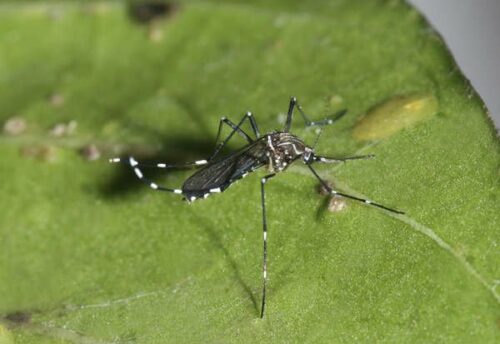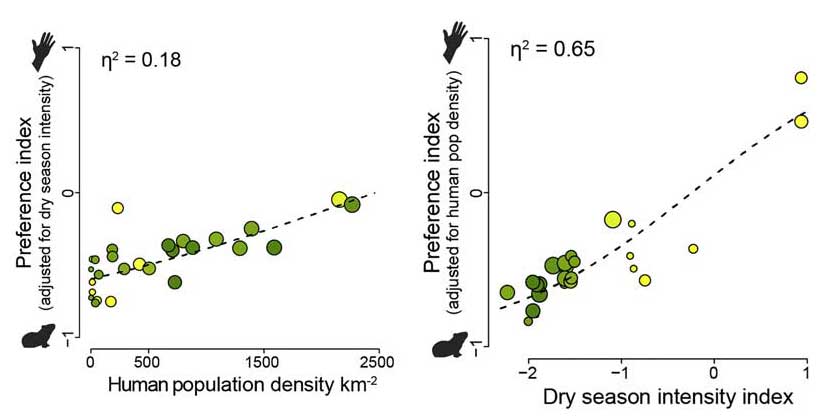
This summer the coronavirus pandemic forced many residents of the northern hemisphere out of air-conditioned spaces and into the great outdoors for socially distanced get-togethers, barbecues, playdates, drive-in movies, and dining. There, we became the de facto buffet for biting insects. While we balanced our drinks, mosquitoes also had a sip … of human blood. New research published this summer explains why some mosquitoes just can’t leave humans alone, while others prefer a nice, juicy guinea pig. The answer, of course, comes down to evolution…
Where's the evolution?
First, mosquitoes are not all the same. Though it might feel otherwise when you are fighting off a swarm, most of the world’s 3,500 mosquito species feed on a wide variety of vertebrates and don’t particularly like human blood. Only a few, like the mosquito Aedes aegypti, which spreads Zika, dengue fever, and other scourges, evolved to specialize on humans. And even within the species that prefer human blood, there is variation. For example, some populations of A. aegypti in Africa don’t fit the mold: some seem to be more tempted by the scent of a non-human animal than by human odor.
To find out what could cause a mosquito lineage to evolve a narrow preference for human blood, researchers first needed to learn more about how preference varies. So they collected A. aegypti eggs from a variety of sites in sub-Saharan Africa, including large cities, open savannahs, and dense forests. They then used these eggs to establish separate colonies of mosquitoes in a lab and presented individual insects with a choice: head towards the guinea pig or head towards the exposed human arm? The mosquitoes did not choose randomly. Instead, mosquitoes from the same colony had similar preferences. Insects from some colonies nearly always chose the human arm; others strongly preferred guinea pig. Since all the mosquitoes were raised in the same lab in the same way and yet behaved differently, the finding suggests that odor preference is influenced by the individual mosquito’s genes.
In order for a trait to evolve by natural selection, three conditions must be met: (1) it must have variation, (2) this variation must have a genetic basis, and (3) there must be selection (i.e., a difference in an organisms’ ability to survive to reproduce) because of that trait. Based on these results, it was clear that there is variation in host preference among the mosquitoes (i.e., insects from some areas prefer humans; others prefer non-human animals) and that this variation can be chalked up to genetic differences among the populations. But was there a selective advantage to specializing on humans, and if so, what was it?
To investigate that question, the researchers analyzed how a colony’s preference related to the site from which the eggs had been collected — whether it was urban or wild, and what the climate was like. They found that colonies that preferred humans were likely to come from areas with a dense human population and were especially likely to come from areas with an intense dry season.

These findings hint at a selective advantage. Mosquitoes lay their eggs in standing water. In areas with an extended dry season, the lack of water could block mosquito reproduction. But in these landscapes, humans, because they need water also, are a reliable source of standing water. Hence, mosquitoes may be forced to rely on human populations to lay eggs. So any mosquito that happened to carry genes that made it prefer human blood would have been more likely to stick around groups of humans — and so more likely to have access to water when it came time to lay eggs. Or perhaps, a mosquito that preferred human blood and was already hanging out around humans found itself with an abundant untapped resource (lots of juicy humans to bite) — and so was able to produce more eggs than other mosquitoes that had to go out looking for non-human animals to bite. In either case, those mosquitoes that preferred human blood would get more of their genes into the next generation — and so the frequency of genes that make mosquitoes like human blood would increase in that population.
The hypothesis that access to water was the key factor causing some mosquitoes to evolve a preference for human blood is an old one. But this is the first time that biologists have investigated that hypothesis directly. And uncovering a link between high densities of humans (i.e., city living) and the evolution of bloodthirsty, human-loving mosquitoes has important implications for the future.
Africa is currently undergoing rapid urbanization — a trend in which people move out of rural settings and into cities. The new evidence suggests that, in the past, urbanization in dry landscapes has triggered the evolution of mosquitoes that specialize on humans. The same selective pressures uncovered by the new research apply today and could favor the evolution of even more mosquito populations with a taste for human blood. For affected city-dwellers, this would be, not just be annoying, but also dangerous. Illnesses carried by mosquitoes already sicken about 100 million people per year, with increases looming if urbanization has the predicted evolutionary result.
While uncovering this threat, evolutionary theory also highlights ways to combat it. For example, aggressively eliminating mosquito breeding sites within cities has a twofold benefit. Of course, it reduces the mosquito population in the near term. But it also reduces the selective advantage offered by specializing on humans. In the long term, this should slow the evolution of mosquitoes’ taste for humans… and make future summers’ outdoor gatherings a little less infested and a little more festive.
Primary literature:
- Rose, N. H., Sylla, M., Badolo, A., Lutomiah, J., Ayala, D., Aribodor, O. G., ... McBride, C. S. (2020). Climate and urbanization drive mosquito preference for humans. Current Biology. DOI: https://doi.org/10.1016/j.cub.2020.06.092. Read it »
News articles:
- A description of the research from the New York Times
- An overview of A. aegypti evolution from the Atlantic
Understanding Evolution resources:
- An overview of the concept of natural selection
- A review of the concept of evolutionary fitness
- Clarification of common misconceptions regarding natural selection and adaptation
Background information from Understanding Global Change:
- Review the process of natural selection here. In a series of steps, explain how a gene that confers a preference for human blood might spread through a population of mosquitoes near a city in dry landscape. Be sure that your explanation includes the concepts of variation, inheritance, and selection.
- The article above suggests that mosquitoes have the variation needed for host preference to evolve by natural selection. Give an example of this sort of variation.
- In your own words, describe the evidence supporting the idea that, among mosquitoes, preference for biting humans versus non-human animals has a genetic basis.
- Imagine that the researchers set up their mosquito colonies in the lab so that mosquitoes were raised in conditions that closely match the climactic conditions of their collection sites. Then the researchers tested the mosquitoes’ preferences. Would you still be confident that preference for biting humans versus non-human animals has a genetic basis? Explain your reasoning.
- In your own words, describe the evidence supporting the idea that the availability of water near cities helped shaped mosquitoes’ preference for biting humans versus non-human animals.
- Teach about natural selection and climate: This adaptable instructional module for grades 9-16 uses insects as a model system to illustrate the biological impacts of climate change, with the goal of engaging students with a range of hands-on and minds-on activities that increase their understanding of how science works, evolutionary processes, and the impacts of climate change.
- Teach about variation and natural selection: In this activity for grades 9-12, students watch a short film about rock pocket mice and complete a worksheet and graphing exercise that reinforces the concepts of variation and natural selection.
- Teach the basics of natural selection: In this activity for grades 9-16, students find that selection occurs in a dish of mixed candies.
- Rose, N. H., Sylla, M., Badolo, A., Lutomiah, J., Ayala, D., Aribodor, O. G., ... McBride, C. S. (2020). Climate and urbanization drive mosquito preference for humans. Current Biology. DOI: https://doi.org/10.1016/j.cub.2020.06.092.
